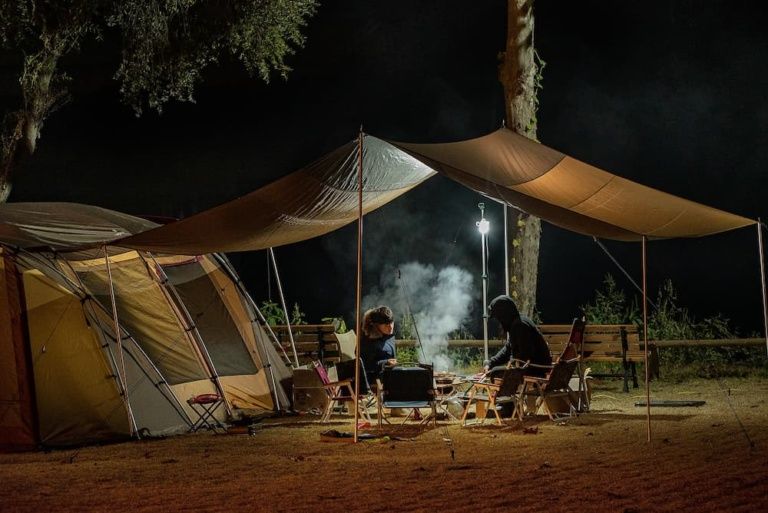Camping and Caravan Safety

To ensure your camping holiday goes smoothly, especially if it’s your first time in a tent, please be aware of the key fire safety issues:
- Allow at least six metres of space between tents and caravans.
- Never use fuel-burning devices (e.g. disposable barbecues, camping stoves, camping heaters, lanterns, and charcoal grills) inside a tent.
- Never use candles in or near a tent – torches are much safer.
- Flammable liquids and Liquefied Petroleum Gas cylinders should be kept outside the tent.
- Oil burning appliances are not recommended.
- Cooking appliances should never be used inside small tents.
- Never light a candle or have any other kind of flame burning apparatus in or near to a tent.
- Cook outside and away from the tent.
- Don’t smoke inside the tent and keep any flammable material away from the cooking area.
- Have an escape plan.
Be carbon monoxide aware
Never use fuel-burning devices (e.g. disposable barbecues, camping stoves, camping heaters, lanterns, and charcoal grills) inside a tent. Using these indoors can cause Carbon Monoxide (CO) poisoning. Click here for NHS Guidelines.
They give off fumes for hours and hours after you have used them – levels high enough to result in CO poisoning.
To avoid hazardous CO exposures, fuel-burning equipment should never be used inside a tent, camper, or other enclosed shelter.
Fuel-burning equipment can include:
- Camping stoves
- camping heaters
- lanterns
- charcoal grills
- disposable barbecues.
Opening tent flaps, doors, or windows is insufficient to prevent build-up of CO concentrations from these devices. When using fuel-burning devices outdoors, the exhaust should not vent into enclosed shelters.
Caravan
When staying in a caravan, a working smoke alarm is just as important as having one in your home.
If a fire breaks out in a caravan or mobile home it is always serious, so please make sure you know what the fire arrangements on the camp site are, and where the nearest telephone is.
Inside the caravan:
- Caravans should be fitted with a smoke detector and have the dry powder fire extinguisher located near the door - optical alarms are usually most effective.
- If you smoke, use metal ashtrays - and never smoke in bed.
- Don’t leave children alone inside.
- Don’t block air vents - if any leaking gas builds up you may fall unconscious and be unable to escape. Always keep the caravan ventilated. Ensure that air vents are clear - if air vents get blocked, it could be fatal.
- Turn off all appliances before you leave the caravan or go to bed.
- Never use a cooker or heater whilst your caravan is moving.
- When cooking, don’t leave any pans unattended.
- Find out the firefighting arrangements on the camp site.
- Don’t dry clothes over the stove.
- Keep children away from matches or lighters.
- Children should never be left alone in a caravan.
- Remove any litter and rubbish near the caravan to reduce the risk of fire spreading.
- We recommended that you have the following safety equipment for caravans: fire blanket, smoke alarm, dry powder extinguisher.
- Gas cylinders should be kept outside the caravan. Gas cylinders should be turned off unless they are designed to run continuously and you should only change the bottle when they are completely empty.
- If you suspect that there is a gas leak, turn off all appliances and the main cylinder valve, open all doors and windows and do not smoke or turn on any electrical switches or appliances until you have been given the all clear.
- Never use fuel-burning devices inside the caravan (e.g. disposable barbecues, camping stoves, camping heaters, lanterns, and charcoal grills).